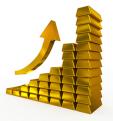The Coming Internet Depression
Ludwig von Mises once wrote that economics and finance are the youngest sciences and are still in their embryonic stages of development even at this time. It has been only in the past two centuries that most of the existing body of thought around these sciences has been developed. Due, then, to the fact that economics and finance are still very young sciences as well as to the fact that both have a reputation among the great masses of men as being arcane and indecipherable, it is not surprising that even the most basic assumptions and fundamental tenets behind the monetary sciences are largely unknown to the public.
One of these basic assumptions, much like that of physics, is that for every action there is an equal and opposite reaction. Or, in simple terms, "what goes up must come down," and the higher something rises the harder it must fall. In technical analysis this is known variously as the "Rule of Action and Reaction," or simply, the "Alternation Principle." After an unprecedented run-up in share-price, the Internet stocks—and by extension, the Internet economy—are rapidly returning to earth in fulfillment of this adage. And since the great majority of what is known as the "New Economy" is benchmarked off the Internet, it too will share the Internet's fate.
What we are proposing is that the coming Second Great Depression will be a direct consequence of America's embracing of the Internet. Insofar as the Internet has contributed to the economic bubble, it will just as heavily contribute to its demise. This conclusion is inescapable when all the evidence is reviewed, a summary of which is contained in this article.
Perhaps one of the most profound ways in which the Internet has powered the so-called "U.S. economic miracle" has been through the massive infusions of liquidity from stock trading, particularly in the shares of tech-based companies. Indeed, the Internet itself has contributed directly to this by virtue of the fact that most stock transactions are performed with it. It would not be an exaggeration to state that Internet stock trading is to a large degree the lifeblood of the U.S. economy. On this score, Sy Harding, editor of the Street Smart Report, made a cogent observation earlier this year concerning the disproportional influence that Internet day-traders exert upon the markets these days. His comments are worth repeating:
"Here's a scary thought: Five million day-traders chasing 100 tech and Internet stocks have taken over the stock market. Not possible?
"Consider this: Most shares are owned by insiders, mutual funds and long-term investors. Yet, many weeks up to 50% of the float in the hot stocks is traded. Such a volume of stock repeatedly changing hands can only indicate day-traders are producing the stocks' moves. And those 100 stocks dominate the Nasdaq, accounting for 90% of its gains.
"Thirty-two percent of the S&P 500 now consists of tech stocks, and accounted for more than 65% of that index's gains last year. And in the past few months, Microsoft, Intel and SBC Communications were moved into the Dow, so seven of the 30 stocks in the Dow (24%) are now tech stocks.
So if day-traders are controlling the movements in those 100 dominating stocks, and those 100 stocks are dominating the indexes, then it follows that day-traders have taken over much of the control of the stock market.
"If that doesn't scare you, then you probably haven't read much about what goes on in the day-trading rooms and how the decisions are made…But what will happen if day-traders discover that the market goes down as well as up, and that they can also trade that direction with short-selling?
They may not care about the underlying value of a stock, but they don't have to be rocket scientists to…realize that even rockets come back down. If they do switch to selling short when it happens they will surely accelerate the downside just as they've been accelerating the upside. Just a thought."
Undoubtedly, the Internet provided a massive boost to the U.S. economy at a time when it was most needed. The U.S. economy has been under the pressure of K-Wave deflation now for 20 years, and this deflationary impulse, while initially of great benefit to corporate profitability, began to pick up steam and exert a destructive force on the segments of our economy that were capital-intensive. The first signs of cracks in the financial edifice appeared with the stock market crash of October 1987, followed by the recession of the early 1990s. This led to an erosion of the industrial base, and the better part of the past decade has witnessed the systematic de-capitalization of the U.S. industrial economy. Manufacturing has almost entirely left the country as a consequence of destructive deflationary pressures on corporate earnings. Companies were forced to seek new host countries for their manufacturing bases in order to maximize returns and save on input (i.e., labor) costs.
What this has meant for the U.S. is a transformation from an industrialized, capital-based economy to a service-based economy in which labor-intensive production is outsourced foreign markets. In short, the U.S. economy has been de-capitalized.
In order to balance the destructive impulses of K-Wave deflation, it was necessary to find even more ways of boosting productivity in the domestic economy. One of the principle contributors to U.S. economic growth in recent years has been technology, especially Internet technology. The Internet proved a vital stimulus to the U.S. info-based economy in that it drastically cut input costs and exponentially increased efficiency. But this cost-saving, labor-saving efficiency device is a double-edged sword.
The vast deflationary potential of the Internet is no secret. Indeed, for every dollar in productivity and input costs the Internet saves, even more money is lost through its tendency to stimulate damaging hyper competition. With the mere touch of a keyboard, the buyer may find the lowest-priced product or service almost instantly, thereby eliminating myriad competitors. Needless to say, the Internet has contributed to the desuetude of a countless of number of businesses that were unable to compete with Internet's unmatched capability for price discovery.
But the Internet's greatest asset is also its Achilles' heel. Even as the Internet opened (temporarily, at least) doors for businesses to remain competitive with the lowest amount of input costs, the Internet is now starting to erode the profitability of these same companies. In fact, the Internet's money-making potential has never been proven—it was all a theoretical concept to begin with. As it turns out, the same overhead costs that characterized most "old economy" businesses are still present with Internet-based companies. Goods and services must still be built, stored and delivered, all of which requires capital. Since 85% of all e-commerce involves physical manufacturing and transportation, not much has changed in the way business is transacted—only the medium through which those goods are ordered.
When the Internet bull market was running at full force and everyone clamored to get on board, the potential for profit via the Internet seemed infinite. Making it even more attractive was the fact that with the Internet there were practically no barriers to entry—literally anyone could get in and start a business. Few, however, took into consideration the basic law of economics which states that the lower the barriers to entry that exist within a given sector or business, the lower the probability that the business will return a sustained profit due to the hyper-competition that that business is sure to produce. Put another way, the very nature of the Internet economy guarantees that supply will outweigh demand since too many people were fighting for a piece of market share in a limited market. The massive number of Internet start-ups in recent years (most of which have been unprofitable) only added to this glut of Internet-related businesses, and in turn, to the Internet\ stock crash, which is still underway.
Now that this reality is slowly beginning to sink in, investors are realizing that the lofty levels to which Internet stocks were bid up in the past few years were found to be based on nothing more substantial than the air itself. Consequently, we have witnessed a massive and sustained sell-off of Internet stocks, many of which have been discounted in price anywhere from 75% to 100%. One stock in particular, ICG, has seen its stock drop from a high of $39 to .75 on September 22, 2000. ICG handles 10 percent of the nations dial-up Internet traffic, serving more than 700 cities. All of this is a precursor to the much broader stock market crash which is to follow, the most dynamic part of which will take place between now and February.
Despite the well-known plights of several leading Internet stocks, in which billions of dollars in capitalization have been erased, the most extraordinary devaluation of Internet stocks has yet to begin. This truth is made manifest by analyzing the long-term charts of Internet stalwart America Online (AOL). The monthly bar chart for AOL shows the considerable crash potential for this stock. An initial sell-off in 1999 and subsequent consolidation in 2000 has paved the way for an even greater sell-off from its still-lofty (in percentage terms) perch. Notice the extreme declining tendency in trading volume over recent years. As AOL's stock price fluctuates in a narrow range—which apparently represents distribution—volume support has been gradually withdrawn. Volume has contracted so far as to leave hardly any room for further declines, which means a sell-off is nigh at hand. Once the critical support zone in AOL's chart is penetrated, prices will have nowhere to go but downward. AOL should be viewed as a leading indicator of the entire Internet sector since it represents one of the most widely-known and high capitalized of the Internet companies.

In yet another sign that the Internet economy is failing to live up to its potential, Priceline.com, which helped to pioneer the concept of name-your-own-price via the Internet, recently announced that it is closing its online bidding site for gas and groceries. The company's Priceline WebHouse Club concept failed, losing nearly half a billion dollars in the process. The consumer-products companies that supplied Priceline weren't willing to give the company the discounts it needed in order to make buying from the Internet seller profitable. As the Wall Street Journal observed, "The demise of WebHouse Club raises questions about the sustainability of the name-your-own-price concept, which [Priceline] patented and pioneered with airline-ticket sales."
In an amazing departure from the rose-colored, sky's-the-limit optimism that has characterized national discourse on the Internet's economic impact heretofore, the possibility (nay, the inevitability) of an Internet-led economic crash is now being given serious consideration in the mainstream press. Consider the recent book release, The Coming Internet Depression, by Business Week's economics editor Michael J. Mandel. While the title is somewhat misleading (Mandel isn't quite as bearish on the U.S. economy as the title would lead you to believe), the author nonetheless outlines his argument that the downturn in the Internet economy is inevitable and could drag the rest of the economy down with it.
Mandel subscribes to the flawed ideology of the "New Economic Paradigm," believing that the classical business cycle has been supplanted with what he calls the "tech cycle." Nevertheless, his arguments on the Internet's destructive potential on the engine of the U.S. economy are both valid and cogent.
Mandel considers venture capital crucial to this process, along with a strong market for tech stocks so that the VCs can cash out. But the strength of the new economy, in Mandel's view, is also its weakness. He describes the new economy as characterized by increasing returns to scale, meaning the more items you produce, the lower your average cost of production. He provides the analogy of most software or literary fiction: Much time and money goes into the first copy, after which reproduction is trivial.
These enterprises, however, depend on growth to survive, and Mandel worries that when the economy slows (whether because of a stock-market crash or some other cause), investment in such future-oriented activities will have to be cut sharply, something that will be especially pronounced at Internet companies. He reports that at eBay and Webvan, for instance, capital spending accounts for about half of operating expenses.
Here, Mandel's insightful observation and penetrating analysis ends. Typical of the Keynesian views of Business Week, he advocates the creation of fiscal and monetary policies that support demand and extend taxpayer-funded safety nets that provide more security without eliminating market incentives (a contradiction to say the least), and "more supervision and regulation of financial markets, domestic and international.
The Internet has been granted every possible concession in order to ensure its progress, mainstream acceptance, and integration into the U.S. and global economy. Unbeknownst to most, the Internet "revolution" has been widely subsidized off the back of U.S. taxpayers through various direct and indirect taxation measures, including the "phantom tax" known as the Universal Service Fund. The Internet has also been the beneficiary of that rarest of all concessions—a lack of formal regulation and federal oversight. Yet despite all of this, it has failed to live up to its highly touted potential, and failed miserably. Moreover, the worst has not even been seen yet.
It will not become apparent that the great "New Economy" experiment has ended in disaster to the public until next year. Most of them will cling to the last shreds of delusional hope throughout this fall's market crash and into next year. Only when the economy itself is dragged headlong into depression will they realize that our national inheritance was thrown away in exchange for an intangible, worthless technology that could only offer promises with no real hope of ever being a source of economic growth.
What happens then is anyone's guess. But of one thing we may be assured: just as the Rule of Action and Reaction sealed the fate of the Internet bubble and of the intangible economy, it will also ensure the resurgence of the physical economy, of which gold will compose the principle financial asset.

















